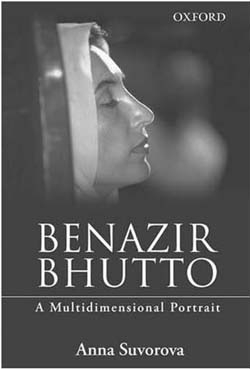A complex, enigmatic web of contravening ideas and beliefs shaped Benazir Bhutto’s personality and also determined her political journey in one of the most challenging contexts in the region—Pakistan. As a newly created state with a religiously defined national identity, Pakistan’s social strata was yet to reconcile with the assertions and authority of women as politicians. Therefore, for reasons well understood, a wide range of scholarship has commented upon the life and political trajectory of the late Bhutto scion—a life so splendid, politically charged with its share of agony, yet cut short in a brutal assassination. Anna Suvorova’s (Professor of Indo-Islamic Culture at the Institute of Oriental Studies of the Russian Academy of Sciences, Moscow) book is a useful addition to the existing body of literature on the ‘daughter of the East’. By all accounts, Benazir Bhutto, the eldest of Zulfiqar Ali Bhutto’s offsprings was his political heir apparent. He put Benazir through early political acclimatization to make her fearless and politically astute.
The book, a translation from the Russian, traces the origin of the Bhuttos in Sindh to carve out an anthropological explanation while recounting their lives. It makes a detailed analysis by revisiting most of the crucial turning points in Benazir Bhutto’s life— circumstances that shaped her political and personal choices—including the decision to marry the then non-political Asif Ali Zardari. Benazir’s unwavering affection for her late father is evident at several points in the narrative. Zulfiqar Ali’s premature and rather unsettling end, Benazir’s own prolonged stints in confinement rendered her enormous mental strength and perseverance to survive in the parochial political landscape of Pakistan. She refused to reconcile with the injustice meted out to her father and, hence, fought relentlessly against the perpetrators behind his prejudiced trail and execution.
The book ably unravels the ‘multi-dimensional’ personality behind Benazir Bhutto—educated in the best universities of the West, inherited and imbibed the western modern, liberal outlook from her father, yet was able to attain power and authority in a male dominant political set up like Pakistan. Despite her western antecedents, Benazir Bhutto in her political career did not seem to abandon the basic tenets and religious orientation overriding the rightful conduct of women in public. Her decision to also have a family life while nurturing political ambitions seemed grounded in harsh realities that surround women who opt for public life in conservative societies. Much of Suvorova’s account is situated in the larger political, ethno-cultural and historical realities of Pakistan. For instance, she makes a detailed commentary on Mohammad Ali Jinnah’s marital ties to Ruttie Petit while delineating Benazir’s thoughts on marrying Asif Ali Zardari (on her mother’s recommendation), who belonged to the landed class in Sindh but was perhaps not educated as per elite standards.

